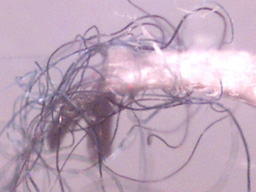So I just got done watching David Russo’s first movie last night. Immediately I thought of two things; Flaubert and Morgellons (a word which will not pass Microsoft spell checks, despite entering the mainstream vocabulary in 2002). A quick explanation of the author, the 'disease' and then of the movie.
Gustave Flaubert is a French realist who inspired British authors to move away from styles of writing like Jane Austen with Pride and Prejudice and go more towards something like Esther Waters by Moore. Only a few brave British authors wrote in this manner, some adopting a serial/realism/self-made-man-still-believe-in-capitalism hybrid (like Dickens with David Copperfield - heavily realistic, still serialized and full of cliffhangers) others continued to ignore it or made comedic plays at it through drama, such as in Dracula. But back to the Frenchmen.
Some people have told me that they find Flaubert boring. I can understand; there are so many translations of his work, it is hard to find one that appeals to a modern English reader. However, his storyline is also undeniable depressing (and the underlying reason for his work getting banned). In his novel Madam Bovary, the two protagonists (they both offer points of narration) essentially project all their wants and needs being satisfied by the other person, only to end up disappointed, dead or heart broken. Throughout the storyline, there are many chances for either Madame Bovary (the second one - yeah the first one died) or Mr. Bovary to 'set their life straight' through the resources available to one that is a 'modern man'. They use every option available to a 19th century person - they go to the law, they go to family and they go to the church. At each time, random events happen which cause them to give up or cause the person that they are seeking to help them to be unable to, because they are too busy dealing with other matters of the world. The novel seems to say that there is a possible fate, and that fate is one of misery and chaos, much like nature. If one is unfamiliar with authors or movements of that time, consider how the period before this was the Romantic period (which, oddly enough, was quite a revolutionary movement) and this period, realism/naturalism, seeks to play off the other. So instead of sweeping sentences telling you how everyone is feeling or about sentimental notions, you get descriptions of a doormat as thorough as a description of someones eyes. Or a description of their impossible to describe bacterial infection that claws away inside them like insects or opiate withdrawal.

(this is the 'least gross' picture I could find on a Google image search)
Morgellons is a hard thing to describe. I first saw it around 2004 when I saw a news report that showed a lady with black lesions on her skin. They were fibrous, about a quarter inch, and when placed in a petri dish, they moved. Black, crawly tissues were all over these poor ladies arms, save for ones that were ripped out by her or sliced off by the medical staff. The report was perhaps a minute long, if at that. I tried to find it online, could not. I have tried to find it since then on three or four other occasions and have still not found this report. When I tell people of it, which is not often (as this is not a 'crusade' of mine), they go 'oh that’s interesting' but in a way where they doubt it. I understand. I would too. You can Wikipedia Morgellons, here’s the link http://en.wikipedia.org/wiki/Morgellons, however I found it not to informative. Still, enough to make one understand the potentiality or repercussions of such a thing existing. The reason I state this, is because *early reports I found linked these fibrous tissues to the use chemicals and sprays in our food*.

The theory was presented that through introducing so many unknown and/or known chemicals, we had developed a new form of life, gathering and living in our bodies, tearing away at our innards. Well, growing in our flesh is more accurate. How did this happen? Through ingestion of these substances found in common food. Like white bread. Please take a look at the Wikipedia page, but, as with every Wikipedia entry, please also look further. And if you find anything, maybe that old CBS or NBC or ABC news broadcast, please, shower my eyes with its horror. But before you do all that, go and watch The Immaculate Conception of Little Dizzy.
After watching the film I looked for some information. All I could find were the official site and some reviews. Looking through reviews, I became disappointed, as it seemed the message was lost on a majority of people. No one thought of Flaubert or of Morgellons! I can understand not linking a 19th French realist to a modern American director’s first feature, but I could not find one link to Morgellons. It made me consider a lot of things; how audiences take in information, how audiences respond to information... but those are much longer articles/essays/posts under a much different context. First, some storyline on the film.
ICOLD (abrv) has a protagonist who works at a middle class tech company who 'loses it' (has an outburst that causes him to get fired) one day and tries to find religion by trying all religions. Throughout the movie he wears shirts like this:
or this
but by the end he is sporting...

This also ties directly into Flaubert - throughout Madame Bovary religion is completely ineffective. In ICOLD the changing of a persons personal paradigm means *nothing*. When he becomes a passive Buddhist, or tries to become rather, he is immediately punched in the face.
He also gets a new job, one that is also a play with binaries, considering he originally is middle class. This job is as a janitor where the director places much emphasis on showing the cameras eye placed on toilet paper, trash, shit stains and urinal cakes all being replaced for people that the protagonist was once a part of. The crew of janitors (which are easy to spot metaphors) work third shift at a corporate office for a company that develops food products. The corporate execs need more focus groups but cannot find any as their food is becoming repulsive, but they find out that the janitors are eating food they throw away. So they use them as a test subject for a new cookie that 'always tastes fresh from the oven'. It even has a logo of a sweet looking Grandma taking cookies out of an oven on the ad. They leave these cookies out, which the group keeps eating, and it causes strange side effects. The strangest being the shitting out of a living, fluorescent blue fish. Before the shitting though, the characters experience stomach pains for days, so they decide to see a doctor. After describing their symptoms and saying that they have been living on cookies, the doctor laughs at them and sends them off, mockingly telling them they should eat less cookies. This is also reminiscent of Madame Bovary.
The most common analysis I see of this movie is that it is a comedy that incorporates toilet humor while failing with its ending and monologues. I disagree. Some of the monologues are weaker than other scenes, but this is because the movie walks a line of happy resolution versus unhappy resolution; the monologues do not allow for a triumphant moment. There is no permanent resolution because the audience wonders if they have any impact on human nature or if it just fate for us to be monsters and treat ourselves in this manner (as in, make food as close to poison as possible or as abhorrent as possible, all for the sake of profit). What defines a comedy? Things work out better in the end. Nothing works out better in this movie for anyone. The fact that reviews and critics find it to be such a comedy rather than a drama and feel that the ending is so upbeat or 'flat' sheds light on an aspect of humanity I am scared of. How much are we willing to ignore? Do we really think if we buy a pair of shoes from acompany it makes any difference?

Can we save ourselves by manufacturing food at such expenses? How corrupted are focus groups? What is capitalism's role, when based on ethics in these modern times, in a land where pornography is watched most by its elite? Is religion really so pointless? All of these issues seem important to me and they are all questions raised in the film, but in a cerebral way that doesn't insult anyone's intelligence. All of these issues also seemed ignored so some reviewers could lazily comment that "a blue fish coming out of your ass reads like a South Park storyline". Yeah? Well South Park ain't got shit on Justine and Russo seems to like the French style. I see a ugly commentary on American capitalism and the fact that humanity is almost at a bottleneck where we have created our own fate. That fate becomes as real as the blue fish out of a mans ass.
I will say no more about the film as it incorporates a subject that deserves a much better treatment than the one I am giving it now. Additionally, I do not want to ruin any of the films impact by spoiling the storyline should someone read this and then watch the film. That being said, ICOLD is on Netflix streaming and available on DVD so I highly recommend getting it in some format and enjoying the hell out of it.







